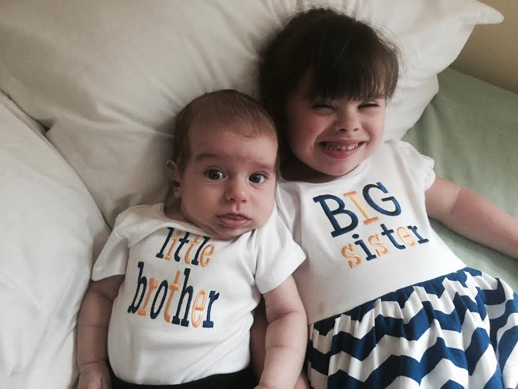A Military Tribute at Arlington to Our Founder
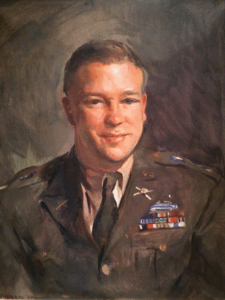
“The morning after Pearl Harbor, I enlisted as a private in the U.S. Army. For the next four years I went from the Medical Corps to the Infantry, from the United States to Africa and back to the United States for Infantry Officer Candidate School at Ft. Benning. In the course of infantry combat through France, I became an infantry rifle company commander. Through the bloody, icy Battle of the Bulge and the struggle through Luxembourg, Holland and across Germany and the assaults across the Moselle River and the mighty Rhine and into Czechoslovakia itself we fought, we maimed, we killed, and were maimed, and we were killed until we stood victorious. We had wounded, killed or captured many thousands of young German soldiers. Of an original company of 187 men and 6 officers, I had three times been reduced to 18 men and no officers. In all the world there is no greater pacifist than a victorious combat infantry soldier at the end of a war – unless it is possibly a defeated combat infantry soldier. Except for uniforms they are astonishingly hard to tell apart. The brains I had destroyed sharpened my desire to return as quickly as possible to my practice of healing rather than destroying.
Since the company whose command I had inherited during the war had been one of the outstanding companies of General Patton’s Third Army, I had received many decorations and the press had made much of it…”
Comments
by Glenn Doman from the book
“What To Do About Your Brain-injured Child”
Tribute
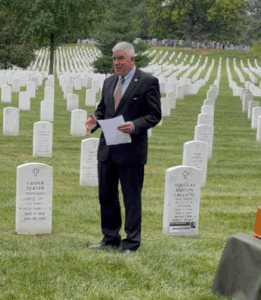
Glenn Doman was nothing if not resilient, and he learned to thrive in adversity. In the Army and throughout life, he was always improving his fighting position on blue sky days so that he and his team could survive and thrive in adversity, on gray sky days. Glenn Doman did nothing by half measure – when he was in, he was all in. Two examples of leadership my grandfather revered were General Patton and Winston Churchill. From Patton, he understood that war is cruel. He was clear-eyed on that. He also learned from Patton to wage war with violent aggression pursued in a noble and just cause – and triumph over tyranny and darkness. From Churchill he drew life lessons on resilience and persistence – never give up, never surrender. When Glenn Doman decided to pursue a course of action, he was all in – whether it was fighting tyranny in Europe, leading a guerilla war on brain-injury or teaching parents how to teach their babies to read. His style is exemplified by the Battle of Gold Brick Hill in Germany in 1945. His company assaulted pillboxes at the top of the hill with fixed bayonets and violence of action while suffering minimal losses. After the battle, a captured German soldier noted to an Army historian that the soldiers had come up the hill with such ferocity, that they immediately decided to put up the white flag.
His Division Commander, Major General Culin, took my grandfather into the Command Post and said “Doman, I have been a soldier for 35 years. I’ve often wondered why. Now I know. I stood and watched your boys take that Hill. My 35 years in the Army were spent waiting for an attack like that.”
To quote his hero Winston Churchill, “You make a living by what you get, but you make a life by what you give.” The world is better now because of the sacrifices of the men and women of the Greatest Generation – a whole of society effort. We standing here are better for their sacrifice. I’m ever mindful of my responsibility to make the world better with whatever tools that have been given to me. Glenn and Katie Doman made remarkable lives for themselves and for the thousands of families they touched through their work after the war.
God willing, we will see you both at the next line of attack.
Erik Knight Doman,
Grandson
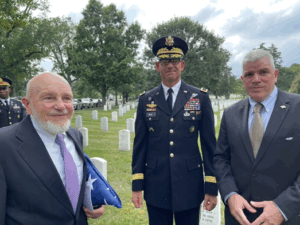
Bruce Doman, Lieutenant General Eifler & Erik Doman
Ladies and gentlemen, it’s an honor for me to be here. I’m Lieutenant General Brian Eifler. I’m the deputy chief of Staff, G1 head of human resources for the United States Army.
What a special day. I first need to recognize, the dignitaries who have joined us today:
From the British embassy representing the British government which recognized Lieutenant Colonel Doman with the Military Cross for his valiant actions.
From Luxembourg which awarded him the Croix de Guerre.
And the United States in recognition of his valor awarded the Distinguished Service Cross and both the Bronze and Silver Star.
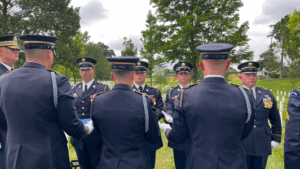
The Flag is folded
We thank you for honoring his heroism today.
You know, the Battle of Bulge has a great history, but for those who went through it, it was hell on Earth. There were many casualties on both sides. There was a huge mass of resistance. But in the end, the Allies prevailed. And it was the last of the German offensive. For the rest of the war that was the big turning point.
And Lieutenant Colonel Doman was there. And like myself, an infantryman, it changed him. But I would tell you, and he would probably tell you; the war changed us for the better.
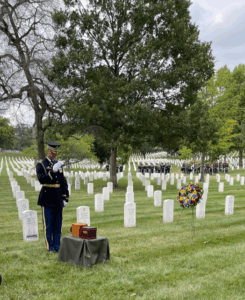
A Final Salute as the band plays America the Beautiful
As part of the greatest generation, it was not just what he did in combat and by answering the nation’s call after Pearl Harbor. But probably even more so, as you all know, as most of you are part of his legacy is what he did when he came home. As Erik just mentioned, the lives of the 25,000 families that he personally impacted and the millions of people that he impacted with his books and with the organization that he created with his wife Katie.
That fine work continues today.
That’s a great example for all of us, especially our veterans, who are war-scarred, war-torn and gone through hell on Earth to come back, as Eric mentioned, and have the resilience that he displayed to carry on and continue his mission on Earth for humanity. We are all better for it today.
Thank you.
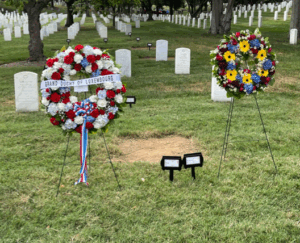
The final resting place in the hallowed grounds of Arlington
Final Notes: A Three-Volley Salute to Glenn Doman

 Donate
Donate


